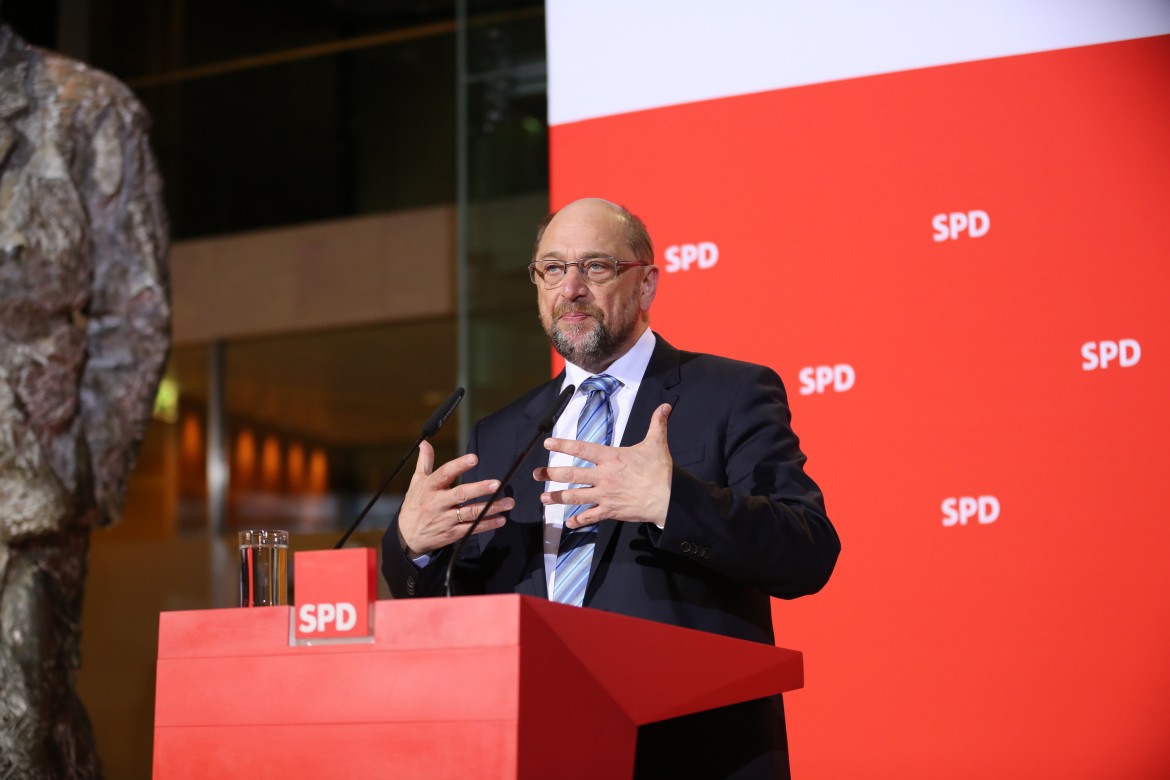Analysis
With a new grand coalition, Schulz faces a socialist revolt
The Social Democrats are pushing forward a successor to Martin Schulz: the 47-year-old Andrea Nahles, who would be the party’s first female leader and would mark a generational shift.

Twenty hours after the celebration of the coalition agreement in which “we saw the Social Democrats’ hand,” Martin Schulz is grappling with an inner party revolt. Bundestag members reproached him for putting personal destiny before the future of the SPD — on the eve of the member referendum expected to occur at the end of the month. Some are asking him, in no uncertain terms, to take a step back. Others who were silent at first are now speaking out.
Everything has been behind closed doors, but their passive voices are crossing the threshold even of normal political debate. Now the disagreements are in the public domain, thanks to revelations in the press, such as the list of SPD ministers, in which vice-chancellor Olaf Scholz stands to be the new finance minister. This historic news is likely to pass quietly, but if Schulz passes the SPD secretariat to Andrea Nahles, a woman will lead the German socialist party for the first time in its 153-year history.
The private meeting of the SPD parliamentary group on Wednesday — “intercepted” by Die Welt — restores the likelihood of Schulz as foreign minister. There was no divergence with the CDU in the meeting that is critical to the ambitions of the secretary. The party leader in Saxony, Martin Dulig, said, “I ask you, Martin, to reconsider your role in the government.” Many members of Lower Saxony, North Rhine-Westphalia, and Hesse had never been heard before, not counting the disobedient Young Socialists already in Groko. This is why the succession has already started.
The future secretary is registered with IG Metall, Germany’s main metalworkers’ union, but also with Attac. She supports the energy of Eurosolar while presiding over the “Friends of the Brandt-Center” in Jerusalem and the SPD training school. She has passed through the requisite curriculum of those who desire to serve in public office, including the Ministry of Labor until 2017.
Yet the key to success for Nahles, a 47-year-old Catholic, is not in the perfect mess but in having convinced — in just seven minutes — 56 percent of the delegates of the Congress of Bonn to vote for Schulz’s “Realpolitik.” In that moment Nahles became secretary in the field, and an alternative to the leader to be condemned by his own words: from “I will not make the alliance with Merkel” to “never in a CDU-led government.”
Beyond personal credibility, the succession in SPD fulfills the “generational turnover” demanded by the majority of the party and accelerated by the participation of many leaders in the government.
But the turning point is also necessary to subvert the polls, which Thursday showed the socialists at 2.5 percent less than in the Sept. 24 elections. There’s anticipation to understand if, and how much, the Nahles line will differ from that of Schulz and what will be the result of the regional vote, starting from Bavaria, at the polls in the fall.
In the new Merkel government, Olaf Scholz remains the top man in the SPD. He’s entrusted with the Ministry of Finance, taken from the CDU. He’ll have to budget the new funds for Europe and the €12 billion for fiber-optic, scrapping the austerity policies imposed by Wolfgang Schäuble. His nature, however, appears in line with his predecessor.
At the Willy Brandt Haus, headquarters of the SPD in Berlin, it is said that the character of the future vice-chancellor oscillates between security and arrogance. But also that he is the best tactician the party has, and the real architect behind the socialists’ ability to secure “serious” portfolios.
Born in 1958, Scholz has been the mayor-governor of Hamburg since 2011. Before that, he served as SPD secretary general from 2002 to 2004 and as minister of labor in the first Merkel government until 2009. The Social Democrats do not particularly adore him — at the last congress he had the worst approval rating (59 percent).
That’s without mentioning the “mayor-sheriff” reputation he enjoys on the left, following a “war-like” atmosphere in Hamburg and the militarization of the G20.
However, Scholz is the perfect figure for the post, even if he has not yet officially accepted. There won’t be confirmation until the members’ referendum, according to the leaders of the SPD. This also goes for the successor to Schulz, which will only be announced after the Groko referendum.
Originally published at https://ilmanifesto.it/coalizione-schulz-merkel-rivolta-dei-deputati-della-spd/ on 2018-02-09
